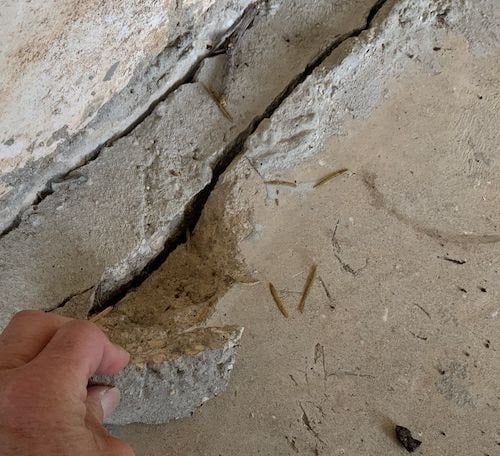Three concrete problems that a floor coating will not fix


When something becomes damaged or doesn’t quite look right, chances are you’re going to try and fix it. The same goes for damaged concrete.
If you notice any cracks in your garage floor, sidewalk, patio, or another concrete surface, you’re probably thinking, “How long has this been here? Is this further damaging the concrete? How can I fix this?”
So you turn to the internet to read how to fix your concrete in the easiest way possible. Maybe you’ve seen concrete coatings on the internet or DIY kits at the hardware store and wonder if a concrete coating will fix the problem you’re having.
We’re here to tell you exactly what a concrete coating is not meant for and does not fix to steer you in the right direction to find the solution to your concrete problems.
Southwest Exteriors has been an exterior remodeling contractor in San Antonio since 1989. We specialize in polyurea and polyaspartic concrete coatings for garage floors, driveways, outdoor patios, pool decks, and just about any concrete floor you have.
Because we are experts in the proper application and preparation needed for a concrete coating, we know the proper condition that a concrete surface must be in for a coating to go on top.
We see dozens of homeowners each month looking for a concrete coating, some of which have damage to their concrete that cannot be coated over with a coating. When this does happen, we’re honest with you that we are not the solution you are looking for and can refer you to a contractor that we recommend.
If you have damaged or uneven concrete and think a concrete coating will fix it, a concrete coating is not the solution you are looking for.
This article will outline three problems with a concrete surface that a concrete coating does not fix. Then, you will know what solution you need to fix your concrete and will not waste time looking for a contractor that can’t fix your problem.
Problem #1. A concrete coating will not fix major cracks
Cracking in concrete is common, and frankly, it’s normal too. As the earth shifts over time, the foundation of your home shifts too. This is what causes cracking in concrete.
Small cracks can typically be easily mended and coated over with a concrete coating, however, larger cracks will need professional care.
What happens if you coat over cracked concrete?
If you have larger cracks in your concrete and try to coat over them with a concrete coating, the result will be an uneven application, and the cracks will still be apparent.
If the cracks are larger crevasses and filled with a concrete coating, chances are, the coating will never cure or won’t cure properly because it will be too thick. This will also create an uneven application and can cause the crack to get worse.
So, how can I fix major cracks in concrete?
Hairline cracks in concrete can typically be coated over with a concrete coating as long as the width of the crack is smaller than the width of a credit card. These cracks are surface level, and a concrete coating will smooth over them.
However, cracks that are larger than the width of a credit card must be mended with a concrete mender.
If a crack is starting to look like the Grand Canyon, expert concrete repair may need to be done to properly fill the crack.
Overall, if you want to just repair small cracks but aren’t looking for a concrete coating, the cracks can be mended with a concrete mender. You can even find the supplies at your local hardware store and do it yourself if you want to.
If you have larger cracks that pose a safety hazard, then you will need to repair and level them with concrete.
Problem #2. A concrete coating will not level your concrete surface
The second problem that a concrete coating will not fix is that it will not level your surface. Whether your garage floor, patio, or pool deck has a slight slope that you do not like, a concrete coating will not do anything to level the surface.
Unlevel concrete can either occur from foundational shifting or the original laying of the concrete. If it was installed unlevel, it will be unlevel.
What happens if you coat over unlevel concrete?
There are no real consequences for coating over unlevel concrete. However, if you have small dips throughout the concrete versus a slight slope, the coating can pool in those dips and not cure fully or properly.
If you coat over an unlevel surface, the coating will not be level either. A concrete coating is not the solution you are looking for if you want to even out your concrete surface.
So, how can I fix an uneven concrete surface?
If your concrete surface is uneven or unleveled, you will need to either tear up the old concrete and relay it completely or lay concrete over to level the surface. A concrete coating is not a concrete leveler and is not the solution you are looking for.
Problem #3. A concrete coating will not keep your concrete from shifting
The third problem that a concrete coating will not solve is keeping your concrete from shifting in the future. As we talked about cracking concrete, foundational shifting is normal.
Although many concrete coatings are highly durable and impact-resistant, they are not going to keep concrete together when shifting occurs.
What happens if I coat over concrete that shifts?
If you coat your concrete surface and the concrete shifts over time, the coating may become warped, crack, chip, or peel.
Minimal shifting may not be noticeable or may only cause flexible coatings to stretch slightly. Polyurea concrete coatings, for example, are made to be flexible, so if the surface shifts slightly, the coating will not crack.
If you live in an area prone to earthquakes, then you must have realistic expectations that a concrete coating will not prevent your concrete from shifting or cracking.
So, what can I do about my concrete shifting?
Foundational shifting is inevitable. Unfortunately, there is nothing you can do to stop your concrete surface from shifting with the earth, and a concrete coating won’t do that for you either.
It is important to have realistic expectations and to know that a concrete coating will not keep your foundation from shifting.
How to tell when a crack in my concrete is structural vs cosmetic?
Determining whether a crack in your concrete is structural or cosmetic can be challenging. Here are some guidelines to help you differentiate:
-
Cosmetic Cracks: They are usually hairline or shallow and have an even surface. They do not affect the structural integrity of the concrete and can easily be repaired using cement patches or fillers.
-
Structural Cracks: They are usually wider than 1/4 inch, uneven, and jagged. You may notice displacement or separation of concrete elements. Structural cracks may be caused by heavy loads, shifting soil, or extreme weather conditions. These kinds of cracks need immediate attention and can compromise the safety and stability of your structure. You should consult with a professional to come up with a repair plan for any structural cracks.
It's always a good idea to keep an eye on any cracks in your concrete and to regularly inspect the foundation for any warning signs of structural damage to avoid costly repairs in the future.
When is a concrete coating the right solution for me?
Now that you know three common concrete problems that a concrete coating does not fix, you can determine what the right solution is to the problem you are facing.
If you have major cracks or damage to your concrete or want to level out your concrete surface, then you will need to contact a professional concrete company that specializes in concrete laying or repair.
If you have hairline cracks or pitting in your concrete and want to cover them up while also upgrading the aesthetics of your concrete surface, then a concrete coating may be what you’re looking for.
What type of concrete coating is right for me?
A concrete coating can provide additional strength to your concrete surface and protect it from future damage, like scratching and chipping. Some coating types are impact and UV resistant, while others are made to just provide a shiny coat on top.
If you think you are looking for a concrete coating, you’re probably wondering what your options are. This article will outline the pros and cons of five of the most common types of concrete coating materials so you can choose the best for you.
Southwest Exteriors offers polyurea and polyaspartic concrete coatings because of their proven durability and longevity. We do not do any major concrete repair work, however, we do repair small cracks and pitting before coating any concrete surface.
If you’re interested in a durable concrete coating that is built to last in your home, then we might have the right solution for you. However, if your concrete has any major damage or you are looking to level out your surface, we are not the solution you are looking for.
Are you ready to get started on your concrete coating project? Schedule a free consultation with a design consultant by filling out the form on our webpage. A representative will call you on the same day to talk with you about your project and schedule your appointment.
